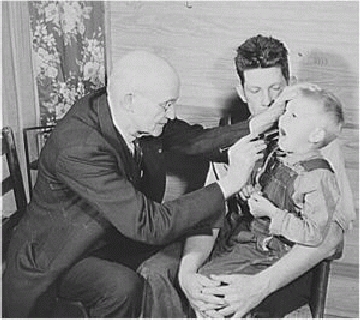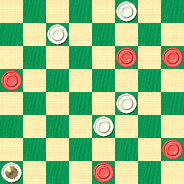The Checker Maven
Jump to navigationCountry Doc

From time to time we feature an article of checker fiction, often an original piece of our own; but once in a while we reprint something that we've come across in an old publication. The following is part essay and part story, and was first published around 75 years ago. As it's now in the public domain, we're running it here for your enjoyment. It may seem a bit long, but it's a delight to read.
THE COUNTRY DOCTOR Devises New Therapeutic System--- Plain Checkers
We live in an age of specialization. All things are built with an eye to quantity of production, or to special excellence of quality. "The specialist" is the cry of the hour.
We had occasion recently to ask an acquaintance what his trade might be. "Mechanic," was the laconic reply. And when we inquired the particular branch of his trade, he confided that he was "Bolt 319 man" at the F--- factory. All day he slips an octagon shaped bolt on a steel rod, pulls it abruptly into position and turns it swiftly with a light hand wrench.
He is a mechanic par excellence. Yesterday there was a leak in the roof trough of his home. Immediately the tinner was called. The kitchen hydrant became frozen on a zero February day. Mechanic "319 bolt" at once summoned the neighborhood plumber. When the hinge on the cellar door works loose, it is the carpenter who is pressed into service. And so on, ad infinitum ... for we live in an age of specialization, and a mechanic is a mechanic a la specialist.
In the treatment of human ills and chills we also find the specialist filling his niche, ready to accept this patient but not the other, a "liver" man but not a "heart" man, or knowing the ways of lung cells but unversed in the pitfalls of digestion. Well nigh every human organ has its following of devoted analysts, diagnosticians and surgeons. The day of the general practitioner is rapidly fading. Even in the smaller cities and villages is seen the enameled or brass sign 'Specialist in ----", following in careful letters the name of the physician. And that old time figure of consolation, the country doctor, well beloved and laden with many cares, with his rig or his Ford and his small leather case--- thermometer, stethoscope, pill and potion--- is gradually drifting away among forgotten presences. In a few more generations he may have become extinct.
There is a lonely village in the northwest corner of the state of Ohio that harbors a general practitioner of the species known as the Country Doctor. He is the village physician, but since the greater number of his calls are made at farm homes within a radius of from five to ten miles, the more fitting name is given him by his city friends. Also he is known variously as the C. J. R., the collector of art treasures, and the Rajah. These are titles imposed upon him by his friends. The C. J. R. is adapted from some obscure passage of Omar, the exact meaning of which has never been revealed. It has the suggestion of some far-away Genie emerging from an Arabian garden, for he is also a lover of plant life. The Rajah is meant to typify an insular imperialism and was bestowed upon the kindly doctor by an acquaintance who came out of the Orient, and found among rare prints and books in his study the memory of an olden ruler, whose authority was unspoken and whose influence was spread about through his power of humanizing abstract and fearful philosophies. Besides, when you come to think about it, a country doctor has a unique position of authority. He is removed from the public glare; his word about the condition or treatment of his patient is law, and he can err fatally or achieve miracles and little will be heard in one case or another beyond the rural circle of his practice. Rajah, then, is one of the surnames of this country doctor.
But what we are getting to is that he is a Rajah of Checkers more than anything else. Quiet, unassuming, a sly humor trickling out for occasion, he has two checker boards ready for play at any hour of the day. One board is kept in his anteroom, one in his examination room. Patients who come to him are usually invited to a game, if no other callers are waiting. He draws slowly at his mild Havana as he meditates his moves. And with each move lie lifts his eyes to observe the effect upon his patient. Often he studies his patients to better advantage over the checkerboard, when they are relaxed and away from the thought of their ailment, than when tapping and sounding them as to their symptoms.
And there are times when he carries a checkerboard with him on his rounds to the sick. For him, the game is a help in diverting the minds of the ailing. Unable to concentrate upon books, his patients often become occupied and even absorbed in the combinations on the board. The doctor plays a strong game and succeeds in winning most of the time, but there are games when he goes down to unexpected defeat, following a sudden lapse of form, due perhaps to a habit of occupying his mind with his patient.
Checker therapeutics is probably an amusing fancy of this country doctor, yet he has accomplished seeming wonders in the treatment of many of his patients, some of them chronic sufferers for years. And they are grateful to him, and come not always to talk of their infirmities, or to pay their bills, but to "let's see what we can do in a game today, doctor."
There are busy periods in the winter months when the checkerboards are not opened for many days, when this kindly, rustic physician is in demand every hour, when the telephone rings on blizzard swept nights and alone over the dark roads he must drive to some house of pain. He knows the people of this community, knows their hearts, and knows, too, their fighting strength, in life and over the board alike. He has seen them tested in both games. To them he is a pillar of support and comfort in time of need. They feel his helping urge. They do not always understand him, but they recognize kindness and assurance in his words.
"There are some games one just can't win", said the country doctor to the writer one day, a little sadly, "some situations that have advanced too far to recover from, but it's really surprising how many apparently lost games can be pulled out into the clear. I've seen them--- I've seen them right . . . well, right over this board."
He drew at his Havana thoughtfully and studied the combination we had developed in our game. Here is a diagram of it:

BLACK
Black to Play and Draw(?)
B:W30,27,14,10,K4:B22,21,20,5,2.
I was ready to concede a loss. But his remark suddenly aroused me to thought, and almost in a flash I caught sight of a chance for a break from Square 21 to 25. I viewed the situation for a half minute and then went boldly into my plan. True enough, it was a success. The doctor followed with 30-21, and I went on from 22 to 26. From then on it was 27-23, 26-31, 23-19, 31-27, 4-8, 27-24, 19-15, 24-19, 8-4, 19-23, 15-11, 23-18, and I found I had retrieved my game and earned a comfortable draw. His easy comment had saved me.
On one of my visits to the country I found the Rajah in a close game with a patient whom he introduced to me as Mr. V----. Later the doctor remarked that his patient was a very nervous subject. "He comes with his head full of dreads, and his heart beating like a trip-hammer. Not much wrong with him though. And somehow he soothes down after a game or two of checkers. Of course, 1 forget some of my moves and he gets me into tight situations. Wins this one, loses the next. Generally has the edge on me. It's remarkable how he forgets his nerves as we play. I've watched him for the past three weeks. Comes in every day for a game or two. And he's improving--- improving."
That's the Checker Rajah--- the country doctor. A man of quiet reveries, of affection for the slight things in life, understood by few, loved by many, and a sustaining force in his community.
Over his door one might well write, "Specialist in--- Checkers."
Editor's Note: This is a great story and a great endgame, but unfortunately it's flawed. In the days before powerful computers, sometimes deep endgame subtleties were overlooked. Though it's anything but easy, can you correct White's play and find the win? In other words, can you cure this position, or will it give you a headache?
Don't get worried sick over it; healing is at hand by clicking your mouse on Read More to see what the KingsRow engine has to say.![]()
Solution
The solution is quite long and is presented in tabular form for easier reading. Variants are possible; use your computer to further explore this fascinating endgame.
| 1. | 21-25 | 30x21 |
| 2. | 22-26 | 27-23 |
| 3. | 26-31 | 23-19 |
| 4. | 31-27 | 4-8 |
| 5. | 27-24 | 19-15 |
| 6. | 24-19 | 15-11---A |
| 7. | 19-15 | 10-7 |
| 8. | 15-18 | 14-10 |
| 9. | 18-15 | 10-6 |
| 10. | 2x9 | 8-4---B |
| 11. | 15x8 | 4x11 |
| 12. | 9-13 | 11-15 |
| 13. | 20-24 | 7-2 |
| 14. | 24-28 | 2-6 |
| 15. | 28-32 | 15-18 |
| 16. | 32-27 | 6-1 |
| 17. | 27-24 | 18-22 |
| 18. | 24-19 | 21-17 |
| 19. | 19-23 | 17-14 |
| 20. | 23-27 | 1-6 |
| 21. | 27-23 | 14-10 |
| 22. | 23-19 | 22-18 |
| 23. | 13-17 | 10-7 |
| 24. | 19-16 | 7-3 |
| 25. | 16-19 | 6-10 |
| 26. | 17-21 | 18-22 |
| 27. | 19-24 | 3-7 |
| 28. | 24-19 | 7-11 |
| 29. | 19-24 | 10-15 |
| 30. | 24-27 | 15-19 |
| 31. | 27-32 | 11-16 |
| 32. | 32-27 | 16-20 |
| 33. | 27-32 | 20-24 |
| 34. | 32-28 | 24-27 |
| 35. | 28-32 | 19-23 |
| 36. | 32-28 | 27-32 |
| 37. | 28-24 | 32-28 |
| 38. | 24-20 | 23-18 |
| 39. | 20-16 | 18-15 |
| 40. | 16-20 | 15-11 |
| 41. | 5-9 | 11-15 |
| 42. | 20-16 | 28-32 |
| 43. | 9-14 | 32-27 |
| 44. | 14-18 | 22-17 |
| 45. | 16-11 | 15x22 |
White Wins.
A---White's 8-4 was incorrect here. White did not realize that to win, he had to give back the extra man. See note B below.
B---In the actual game, White undoubtedly missed the point: giving back the extra man, and then taking this exchange, results in a winning 3x3 ending.
You can email the Webmaster with comments on this article.
